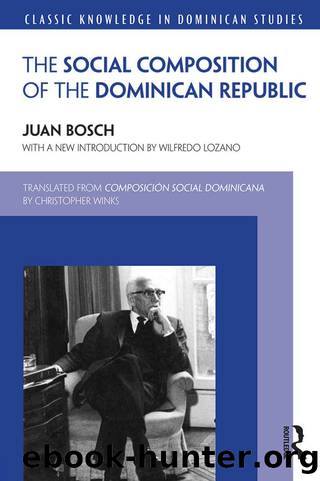Social Composition of the Dominican Republic by Juan Bosch

Author:Juan Bosch [Bosch, Juan]
Language: eng
Format: epub
ISBN: 9781138889835
Barnesnoble:
Publisher: Taylor & Francis
Published: 2016-04-06T00:00:00+00:00
Chapter 14
The Causes of the 1822 Haitian Invasion
The period of âFoolish Spainâ ended on December 1, 1821, when José Núñez de Cáceres proclaimed the independence of Santo Domingo under the name of Haity Español and as a protectorate of Colombia. Anybody else could have done something similar with different goals and the result would have been the same: no one did anything to prevent the foundation of Haity Español, but nor did anyone take steps to support it. And there is a single reason for this: ranch society had failed, and there was no single social class in the country able to take the ranchersâ place. Thus, Núñez de Cáceres acted in a social vacuum with a group of friends. It was as if he had gone out to battle without soldiers against a nonexistent enemy. Two months and nine days later, Boyer entered the city of Santo Domingo with his troops and occupied the country without any opposition. What Boyer did could have been done by the Carib Indians of the Orinoco or the Eskimos of the North Pole, and nothing would have happened either. The social vacuum left by the failure of ranch society would necessarily have produced this result.
In the time of âFoolish Spain,â conspiracies abounded, slave conspiracies in particular, many of them treated with medieval harshness, but a moment arrived in which ranch society no longer had any will to power. Dr. Morilla says as much when he declares that
in the month of March 1820, another case of conspiracy was hatched against the same people who later made the revolution for independence the following year, after the Provincial Deputy of La Vega Don Antonio Valdés and two or three others had been prosecuted; but for lack of any proof of the crime, despite their notoriety, they were absolved;
and shortly after, he says it was known that Núñez de Cáceres was to proclaim independence and that âamong the proprietors and people of influence, Núñez could only count on a few partisans.â
The society of the tobacco growers, still too small to attempt to replace the ranchers in power, was in the Cibao, so they had no political influence in the capital; at that time, the loggers were few in number and scattered around the country. Perhaps, according to Don Pascual Real in 1821 (RodrÃguez Demorizi 1960, 270), the export of mahogany was the countryâs âmost marketable good and source of labor,â but surely there were not many people dedicated to this, so the exporters of timber could not be expected to form a sector with sufficient authority to replace the ranchers.
On February 9, 1822, President Boyer proclaimed the country Haitian territory. Why did he do this? Was Haiti perhaps an imperialist country which occupied Santo Domingo because it was looking for a place in which to invest surplus capital?
Of course not. The occupation of Santo Domingo by the Haitians obeyed a combination of politically and socially motivated conflicts within Haiti and the Dominican peopleâs profound social and political weakness.
Download
This site does not store any files on its server. We only index and link to content provided by other sites. Please contact the content providers to delete copyright contents if any and email us, we'll remove relevant links or contents immediately.
| Antigua | Bahamas |
| Barbados | Cuba |
| Dominica | Dominican Republic |
| Grenada | Haiti |
| Jamaica | Saint Kitts |
| Saint Lucia | Saint Vincent |
| Trinidad and Tobago |
Cat's cradle by Kurt Vonnegut(13941)
Pimp by Iceberg Slim(12983)
Underground: A Human History of the Worlds Beneath Our Feet by Will Hunt(11299)
4 3 2 1: A Novel by Paul Auster(11107)
The Radium Girls by Kate Moore(10955)
American History Stories, Volume III (Yesterday's Classics) by Pratt Mara L(4839)
Perfect Rhythm by Jae(4648)
Wiseguy by Nicholas Pileggi(4638)
The Fire Next Time by James Baldwin(4382)
Paper Towns by Green John(4199)
A Higher Loyalty: Truth, Lies, and Leadership by James Comey(4066)
Pale Blue Dot by Carl Sagan(4046)
The Mayflower and the Pilgrims' New World by Nathaniel Philbrick(3935)
The Doomsday Machine by Daniel Ellsberg(3766)
Too Much and Not the Mood by Durga Chew-Bose(3716)
Killers of the Flower Moon: The Osage Murders and the Birth of the FBI by David Grann(3664)
The Borden Murders by Sarah Miller(3612)
The Sympathizer by Viet Thanh Nguyen(3552)
Killing England by Bill O'Reilly(3484)
